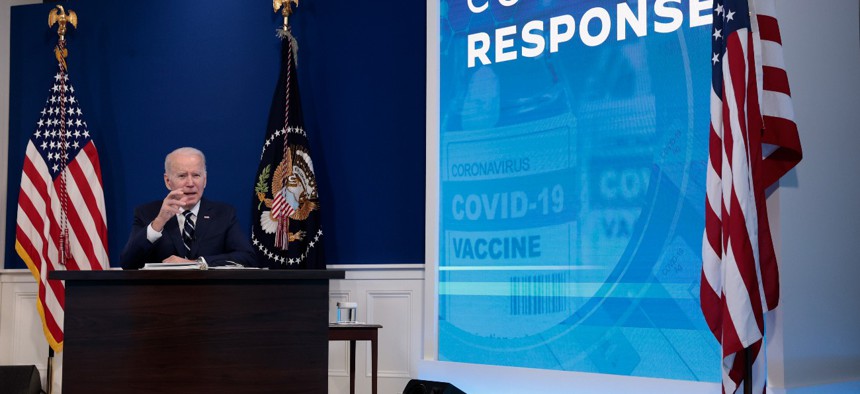
President Biden gives remarks on Jan. 13 on his administration's response to the surge in COVID-19 cases across the country. Anna Moneymaker/Getty Images
Coronavirus Roundup: One Year of the Biden COVID-19 Response
There's a lot to keep track of. Here’s today’s list of news updates and stories you may have missed.
President Biden will give his first press conference of the year at 4 p.m. on Wednesday, which comes the night before the one-year anniversary of his inauguration. Questions about how his administration has handled the pandemic—which is entering its third year—are likely to come up. While the Biden administration’s approach has been different than Trump's, it has encountered its own challenges, especially in regard to keeping up with the Delta and Omicron variants. Here are some of the other recent headlines you might have missed.
President Biden released a 200-page pandemic strategy almost a year ago and “he has struggled to execute key parts of it,” The Washington Post reported on Monday. “Some of Biden’s biggest challenges on executing that plan have been beyond his control, including courts that delayed and then blocked his vaccination-or-test mandates; Republicans who fought calls for masking and promoted vaccine disinformation; and, most significantly, an unpredictable virus that has evolved to evade some protections conferred by vaccines even as it became more transmissible,” said the report. “But many say the United States would have been better prepared to deal with the virus’s curveballs if the administration had more quickly delivered on promises to improve testing and real-time virus surveillance and encouraged masking nationwide, rather than focusing so heavily on vaccines.”
The White House is going to make 400 million N95 masks available for free at thousands of locations across the nation, Politico reported on Tuesday night. The Centers for Disease Control and Prevention updated its guidance on Friday saying N95 and KN95 masks offer the highest levels of protection, but “whatever product you choose, it should provide a good fit.”
The White House’s website to receive free COVID-19 tests had some initial issues in its beta launch on Tuesday, Politico reported. “Some residents in multi-unit dwellings tried to register to have tests delivered but received error messages saying tests already had been ordered for their address,” said the report. “An administration official said the problem was not widespread and that orders are being prioritized for people in areas facing disproportionate COVID-19 cases and deaths — the first 20% of test orders processed will be for people in vulnerable ZIP codes.”
The Small Business Administration’s watchdog issued a report on Tuesday about the agency’s oversight of a grant recipient’s portal for COVID-19 related resources and information, as authorized by the CARES Act. SBA made sure the grant recipient created and launched the hub on time and that the hub worked well and met the technical requirements, said the SBA inspector general. However, “SBA did not ensure the grant recipient adhered to applicable federal procurement requirements when contracting for services to implement the information and training portal,” among other oversight shortcomings.
Challenges to the vaccine mandate for federal contractors are now before four federal appeals courts, Bloomberg Law reported.
Joshua Sharfstein, professor of the practice at the Bloomberg School of Public Health at Johns Hopkins who was previously principal deputy commissioner of Food and Drug Administration from 2009 to 2011, wrote in The New York Times on Monday how the FDA and CDC can better work together on the pandemic response. His suggestions are on testing guidance, reviewing and explaining booster shots and providing guidance to parents of young kids. While the agencies have different authorities, “the usual division of labor, however, has not worked well during the pandemic,” wrote Sharfstein. “The public has been confused by the lack of clarity around how recommendations are made for vaccines and by the finger-pointing when problems arise.”
Gen. Mark Milley, chairman of the Joint Chiefs of Staff, who is vaccinated and boosted, tested positive for COVID-19 on Sunday. He was experiencing “very mild symptoms,” and is able to work remotely, said Joint Staff Spokesperson Col. Dave Butler.
Smithsonian museums in Washington, D.C. and the National Zoo have adopted modified schedules until further notice starting Monday after a similar temporary schedule earlier this month due to staffing shortages as a result of COVID-19. “This newly modified schedule reflects the continued need to reduce operations due to ongoing staff shortages while accommodating the needs of the public by opening more museums on weekends,” said a press release.
The Veterans Affairs Department is delaying its deployment of a new electronic health records system at the VA Central Ohio Healthcare System from March 5 to April 30 due to a surge in coronavirus cases. “A significant number of the workforce at the facility (approximately 209 employees) are ‘unable to work,’ doubling the number of employees reporting this status the previous week and one of the largest changes in this status across all VA medical facilities nationwide,” said a press release from VA on Friday. “VA officials are continuously reviewing the conditions at upcoming implementation sites to ensure local conditions allow for a safe deployment.”
Help us understand the situation better. Are you a federal employee, contractor or military member with information, concerns, etc. about how your agency is handling the coronavirus? Email us at newstips@govexec.com.







